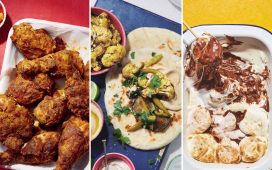A food editor I know who once lived in Paris kept a list of her favorite places to eat there. She wouldn’t give it out to just anybody, though, as I learned when I asked for a copy to pass on to a friend.
The list, she warned, wouldn’t be everybody’s cup of tea. You had to appreciate offal, because some of her hangouts served more kidney and tripe than steak frites. You had to be cool with facilities that verged on the antiquarian, like the trapped-in-amber bistro near Les Halles where the toilet was a hole in the floor flanked by two shoe-shaped raised platforms, one for each foot. Finally, she said, the list was full of spots that offered just a handful of dishes or a single set menu — which could be a problem for, as she put it, “Americans who want lots of choices.”
I remembered this provision the first time I ate at Fradei, which occupies a space only slightly bigger than a camper van in the Fort Greene neighborhood of Brooklyn. The restaurant recently fell under the control of two European owners and two American chefs. In March, after trying various schemes to survive the pandemic winter, they introduced a five-course tasting format. The menu isn’t disclosed at the start of the meal. It isn’t published anywhere until the day after its three-week run concludes, when the restaurant finally posts photos of each course on Instagram. The price is $80. There are no choices.
Right off the bat, I could think of at least a dozen friends I would never bring to Fradei. But by the time I’d finished dessert — an oval scoop of beeswax ice cream striped with buckwheat honey and dotted with nibs of bee pollen, an ode to the hive — I knew there were many more people who would enjoy the restaurant as much as I did.
Across each meal I’ve eaten, courses rhymed and echoed and called back to one another. The pollen and honey called to mind the toasted buckwheat groats that had been scattered around darkly roasted shallots earlier in the night.
On another evening, one ingredient kept popping up like a prairie dog, but it was so innocuous I didn’t notice it at first: milk. Curdled and strained, it made soft ricotta for spreading on warm slices of house-baked sourdough. Cultured until thick and tart, it became the yogurt mousse that served as a kind of sauce for malt ice cream and a paper-thin Frisbee of benne seeds suspended in hard caramel. And then a look-alike, almost a visual pun: something that resembled a scoop of crème fraîche sat next to grilled spring onions and paprika-dusted smoked eel. In fact, it was whipped almond cream, free of dairy but full of associations to Spain that tied it together with the paprika and the grilled onions.
That menu culminated in two rosy pieces of seared grass-fed beef in a black-garlic jus. It’s only now as I write this that I realize that this, too, was a product of cattle.
Robert Cox and Sam Schwarz, who share the chef duties in a kitchen so tight they are essentially dance partners, say that almost everything they cook comes from farms in the Northeast that are sustainable and in most cases organic. So far they haven’t served me anything that was truly out of season.
They do plan ahead, though. Accents are supplied by last year’s preserves. Pickled apple peels may not sound like something to get excited about, but vinegar made with them set off the bittersweet taste of the caramelized shallots. Peach vinegar sharpened the garlic jus that came with the beef, and cherry vinegar brightened a salad of beets with shaved bottarga and seaweed.
Every menu at Fradei features a course of handmade pasta. Although Mr. Cox and Mr. Schwarz worked in Paris only briefly, somewhere along the line they learned to make pasta like French chefs — with so much sauce you need a spoon. Fortunately, their sauces are very good. Even though the herb-and-pistachio pesto made quills of cavatelli look as if they were sinking into a swamp, I’d let it sprawl wherever it wants as long as it doesn’t lose its bits of preserved lemon.
Taking over the kitchen of a small, obscure Fort Greene restaurant between a garden center and a seasonal outdoor cafe was not on either chef’s mind at the start of 2020. Each was cooking at restaurants in the 11th Arrondissement, currently the chief locus of forward-leaning cuisine in Paris. Mr. Cox was at Le Rigmarole, a youngish spot known for grilling things on skewers over Japanese charcoal that don’t usually get grilled over Japanese charcoal, especially not in Paris.
He and Mr. Schwarz met on the street outside a wine bar. Later they worked together in the kitchen at Septime, Bertrand Grébault’s fanatically seasonal, quietly spartan and perpetually booked flagship restaurant. After Mr. Cox moved on, Mr. Schwarz stayed, and was about to be transferred to another of Mr. Grébault’s restaurants when France went into lockdown. The two American cooks returned to the United States for what they hoped would be a brief hiatus.
Around June, as reality was sinking in, one of Fradei’s owners, who had met Mr. Cox and Mr. Schwarz in France, asked them to help reopen the restaurant. It had closed in March. After some stops and starts and pivots, they are now hip to hip in the kitchen five nights a week.
The owners are Simone Finotto, who comes from the Veneto, and Clement Besset, from Brittany. There are no other employees. Mr. Finotto and Mr. Besset wait on the tables, masked in bandannas as if they were just back from robbing a train.
They also buy the wines, which are more European than American. Unfamiliar names and grapes abound, but the two owners will personally vouch for the winemakers, many of whom are friends, they say. They will help you match a wine with the meal while maintaining strict silence about exactly what you’ll be eating.
The bottles being poured by the glass change all the time, although there are perhaps not enough of them on any given night for Fradei to be considered a full-scale wine bar. The term the owners put on the awning, “Italian bistro,” doesn’t quite fit, either. But it does get at the way the owners have merged their backgrounds in Fradei. In Venetian dialect, the name means brothers.





